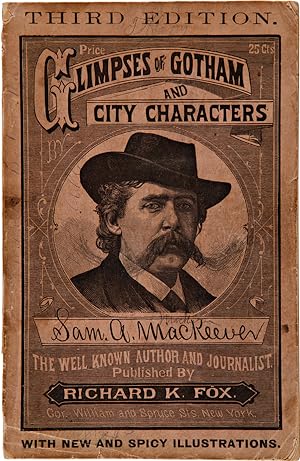Descripción
72pp., plus thirteen plates and two leaves of illustrated advertisements. Original printed pictorial wrappers. Wrappers soiled, corners worn, lacking upper and lower two inches of spine paper. Tanned, scattered light foxing, small closed marginal tears to a handful of pages. Contemporary ownership inscription on front free endpaper, repeated on page 20 (see below). Good plus. Third edition (published the same year as the first and second) of a highly popular collection of sensational columns written by MacKeever for THE NATIONAL POLICE GAZETTE, "with new and spicy illustrations" particular to this edition. The POLICE GAZETTE was founded in 1845 as a magazine about crime and criminals for a general audience, although it evolved dramatically when Richard K. Fox became editor and owner in 1877. Under Fox's tenure, the GAZETTE shifted focus to the lewd and the sensational, becoming one of the first tabloid newspapers and the forerunner to men's lifestyle, sports weeklies, and pin- up magazines such as ESQUIRE, SPORTS ILLUSTRATED, and PLAYBOY. Barely steering clear of obscenity laws for decades, the publication would eventually be banned by the U.S. Post Office in 1942 due to its "obscene and lewd" illustrations. This collection of columns from the first few years of Fox's tenure focuses on the night life and underbelly of New York City in the 1870s. The articles are by Sam MacKeever, described on the titlepage as the "American Charles Dickens." In the articles in the section entitled "Glimpses of Gotham," MacKeever muses on the scenes and people one encounters in the city, lampooning personal ads in the paper, satirizing the average opening-night theatergoing experience, detailing murders and illegal gambling rings, and more. Throughout, MacKeever's writing is steeped in the humor and satirical edge that still characterizes much sensational journalism. Concluding one column on illegal gambling, he writes: "The game in Courtland street was knocked among the sky-scraping kites by a young man losing all he had, even to his head, and then blowing his brains out. The proprietor of the hotel thought it was a strange transaction on the part of the young man. I fail to see anything strange in it. If you have lost your head, what good are the brains? Now, to have a head and no brains is quite a different affair. Plenty of men whom we all know are in that predicament, and experience not the slightest annoyance." MacKeever's "City Characters" columns, on the other hand, tend to tell the tales of individuals, including more than a few nefarious women who use their charms to swindle their unsuspecting marks. The publication is illustrated throughout with the "spicy illustrations" which made the POLICE GAZETTE so popular in the late 19th century. This copy contains the contemporary inscription of "Fred H. Savory, B.L.V.C.R.R. Boston Mass." Savory was born in Warner, New Hampshire in 1859, placing him squarely in the GAZETTE's demographic in the year 1880. At that time, he was employed in the freight department of the Boston & Lowell Railroad (i.e. the B.L.R.R. from his inscription), later returning to Warner and operating a variety of businesses throughout the 1880s and 90s. Not only was Savory of an age-group targeted by the POLICE GAZETTE, his employment by the railroad also shows the popularity of the genre among rail passengers. N° de ref. del artículo WRCAM57227
Contactar al vendedor
Denunciar este artículo
![]()




